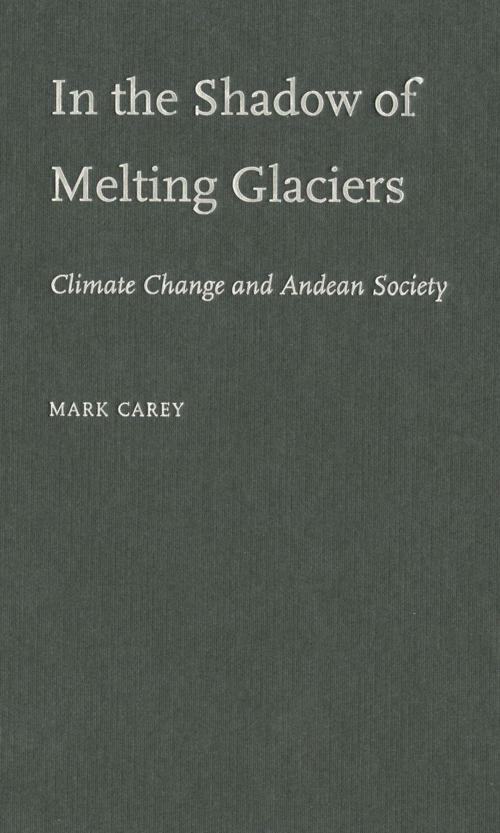In the Shadow of Melting Glaciers
Climate Change and Andean Society
Nonfiction, History, Americas, Central America, Civilization| Author: | Mark Carey | ISBN: | 9780199779840 |
| Publisher: | Oxford University Press | Publication: | April 7, 2010 |
| Imprint: | Oxford University Press | Language: | English |
| Author: | Mark Carey |
| ISBN: | 9780199779840 |
| Publisher: | Oxford University Press |
| Publication: | April 7, 2010 |
| Imprint: | Oxford University Press |
| Language: | English |
Climate change is producing profound changes globally. Yet we still know little about how it affects real people in real places on a daily basis because most of our knowledge comes from scientific studies that try to estimate impacts and project future climate scenarios. This book is different, illustrating in vivid detail how people in the Andes have grappled with the effects of climate change and ensuing natural disasters for more than half a century. In Peru's Cordillera Blanca mountain range, global climate change has generated the world's most deadly glacial lake outburst floods and glacier avalanches, killing 25,000 people since 1941. As survivors grieved, they formed community organizations to learn about precarious glacial lakes while they sent priests to the mountains, hoping that God could calm the increasingly hostile landscape. Meanwhile, Peruvian engineers working with miniscule budgets invented innovative strategies to drain dozens of the most unstable lakes that continue forming in the twenty first century. But adaptation to global climate change was never simply about engineering the Andes to eliminate environmental hazards. Local urban and rural populations, engineers, hydroelectric developers, irrigators, mountaineers, and policymakers all perceived and responded to glacier melting differently-based on their own view of an ideal Andean world. Disaster prevention projects involved debates about economic development, state authority, race relations, class divisions, cultural values, the evolution of science and technology, and shifting views of nature. Over time, the influx of new groups to manage the Andes helped transform glaciated mountains into commodities to consume. Locals lost power in the process and today comprise just one among many stakeholders in the high Andes-and perhaps the least powerful. Climate change transformed a region, triggering catastrophes while simultaneously jumpstarting modernization processes. This book's historical perspective illuminates these trends that would be ignored in any scientific projections about future climate scenarios.
Climate change is producing profound changes globally. Yet we still know little about how it affects real people in real places on a daily basis because most of our knowledge comes from scientific studies that try to estimate impacts and project future climate scenarios. This book is different, illustrating in vivid detail how people in the Andes have grappled with the effects of climate change and ensuing natural disasters for more than half a century. In Peru's Cordillera Blanca mountain range, global climate change has generated the world's most deadly glacial lake outburst floods and glacier avalanches, killing 25,000 people since 1941. As survivors grieved, they formed community organizations to learn about precarious glacial lakes while they sent priests to the mountains, hoping that God could calm the increasingly hostile landscape. Meanwhile, Peruvian engineers working with miniscule budgets invented innovative strategies to drain dozens of the most unstable lakes that continue forming in the twenty first century. But adaptation to global climate change was never simply about engineering the Andes to eliminate environmental hazards. Local urban and rural populations, engineers, hydroelectric developers, irrigators, mountaineers, and policymakers all perceived and responded to glacier melting differently-based on their own view of an ideal Andean world. Disaster prevention projects involved debates about economic development, state authority, race relations, class divisions, cultural values, the evolution of science and technology, and shifting views of nature. Over time, the influx of new groups to manage the Andes helped transform glaciated mountains into commodities to consume. Locals lost power in the process and today comprise just one among many stakeholders in the high Andes-and perhaps the least powerful. Climate change transformed a region, triggering catastrophes while simultaneously jumpstarting modernization processes. This book's historical perspective illuminates these trends that would be ignored in any scientific projections about future climate scenarios.















